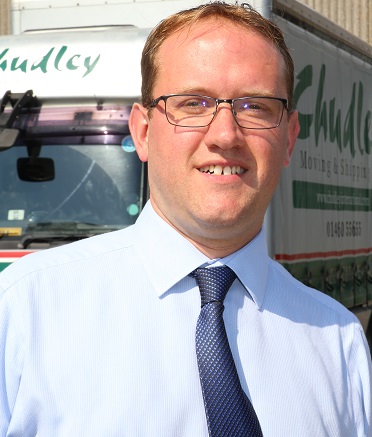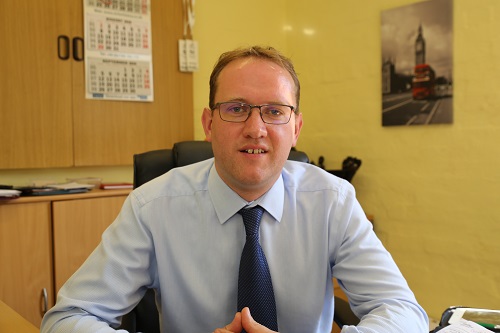Adam Chudley is one of the many thirty-somethings that are taking over from the previous generation bring new ideas and vitality just as their predecessors did. The industry is changing dramatically but, in Adam’s opinion, in vitally important ways, it stays the same. Steve Jordan visited him to find out more about him and his attitude to the industry.
 The business, Chudley International Moving & Storage in Ilminster was started in 1994 by Adam’s father Mark. Mark had previously worked with Derek Blatchford at Blatchpack in Exeter and married Derek’s daughter, Dawn, making Derek, Adam’s maternal grandfather.
The business, Chudley International Moving & Storage in Ilminster was started in 1994 by Adam’s father Mark. Mark had previously worked with Derek Blatchford at Blatchpack in Exeter and married Derek’s daughter, Dawn, making Derek, Adam’s maternal grandfather.
Derek had been one of the founding fathers of the modern moving industry, a BAR president instrumental in the creation of Pelican Van Lines which merged with Britannia in the 1980s and BAR Services. The industry today would look very different had it not been for Derek and those like him.
Mark too, as well as building up a successful business initially focussing on antiques shipping for the American market, is closely involved with the BAR as a director of BAR Services and sitting on the Board for FEDEMAC, carrying on the tradition of service to the industry as a whole. The company now continues a frequent groupage service to the USA and specialises in shipping to Cyprus where it has a close agency agreement with Peter Morton Removals in Paphos.
Adam has inherited his family’s dedication to the industry despite having started his career very differently. Of course he worked at the company as a young man during the school holidays but it was accountancy that initially took his fancy. He went into accountancy straight from college aged 18 but, after five years, decided it wasn’t for him. “It was June and Dad was busy at work. I went back to lend a hand during the summer season and never left,” said Adam. “That was 13 years ago.”
“I always knew I was going to work in the business,” he said. “It was a bit of a legacy thing. My grandfather was BAR president before I was born. I remember a big gilt-framed picture of him as BAR president. We called in ‘grandad with his necklace on’. I was always out on the vans as a teenager, collecting from the flea markets in Paris. It was very exciting in the early days. My accountancy experience gave me a lot of day-to-day business experience. It’s a bit like your French lessons at school: you don’t realise how much you take in until you need to use it.”
Today everything has moved on a bit but it’s still very much a family business. Mark is taking more of a back seat spending much of his time doing surveys; Adam is now operations director; his uncle, Hugh, 13 years his senior, handles the antiques side of the business; and Sarah, Adam’s step sister, is the accounts manager.
 The biggest change Adam’s generation is having to deal with is technology. The company installed Moveware five years ago and having compared it with other systems, found it best able to handle the number of variables in the business. “The other systems are great too but we thought Moveware worked best for us,” said Adam.
The biggest change Adam’s generation is having to deal with is technology. The company installed Moveware five years ago and having compared it with other systems, found it best able to handle the number of variables in the business. “The other systems are great too but we thought Moveware worked best for us,” said Adam.
The company is now on its fourth website with the company investing time and money on its development. “Customers want prices from websites and they don’t want to spend too long getting them,” said Adam. “If you make people give you information on the website then don’t give them a price, they feel you have robbed them of their time.” Adam also realises that he needs to spend more time making social media work harder for the company. “It’s now a big part of our discussions at Board meetings. It’s definitely worth the effort and I know we could get more out of it.”
He chooses not to use price comparison sites much but acknowledges that they have had an effect on the industry. “It seems that the industry is becoming more split into the traditional movers and the menu movers,” he said. “Companies wanting to provide a traditional service can continue to do so but it will become an expensive niche. There’s not enough money in our business, we have all said it for years. People pay for lawyers and estate agents but they don’t want to pay for removals. The problem is people can’t get a law degree in five minutes but they can get a van. We are an easy set-up industry. Moving should be seen as a speciality industry, but the public don’t seem to see it that way.”
One major development that Adam has embraced is the concept of Skype and FaceTime surveys (see page 40). A surveyor simply contacts a customer by smartphone and is shown around the house through a video link. It saves time, is cheaper and it’s what customers want. “It might not work for the bigger moves or where people want a personal service but most of the time it does fine,” explained Adam. “The world has become much more ‘price savvy’ with people paying a lot less for goods and services.”
Apps are also likely to take a bigger role in the industry according to Adam, especially were things are done regularly. “We already carry out our daily vehicle checks using apps,” he explained. “I think it’s on the operations side that this technology will be of most benefit to us.”
Just like Derek and Mark, Adam has done his share for BAR. He was very much involved in the Young Movers Group which, he said, is now being reinvented. “I think it’s really important to get people together talking about the industry and how they work,” he explained. “We have people in the industry who have knowledge in bags full and are willing to pass it on. But it has to be accessible and affordable. The young generation sits in an office every day and doesn’t get out there and learn about the world. You have to meet people. How do you challenge the way things have always been done if you don’t look?”
Everything is measured by money. How much extra business do you get from attending a conference? “But it’s very difficult to quantify the monetary gain of running our business slightly differently because we’ve seen how someone else does it. People don’t get out because they don’t think they need to. Everything is done remotely now. We text not call. Even our relationships with customers is more arm’s length. To experience directly is much more powerful.”
What’s the biggest challenge for the immediate future? “Brexit,” said Adam, without hesitation. ”I think the country will become much more uncertain. The housing market will slow down. There isn’t much room for further interest rate cuts. The European market will become difficult. It won’t disappear but people will think twice about it." He admits to slipping into a period of fear immediately after the Brexit vote. “But I’m coming out of that now, simply because we have to.”
Although the industry has changed and it will be Adam’s generation that continues the process at an ever increasing rate, he believes that in one important aspect, nothing changes. “It’s still a people business built on networking, mutual respect and friendships. Nobody should forget that.”